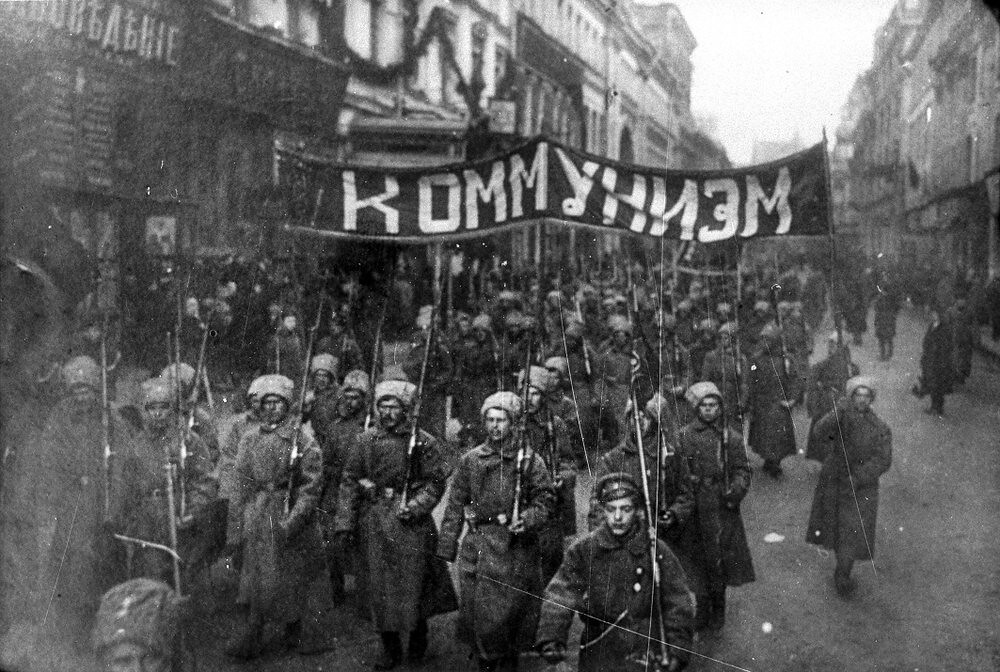This is how we would have to describe what happened in Brazil if the left had done it
This Sunday, hundreds of followers of Jair Bolsonaro assaulted the buildings of Congress, the Presidency and the Supreme Court of Brazil.
The use of violence to try to take over the institutions in a democratic country, whoever does it, is something that always deserves to be condemned. But it has not always been so. Let's look at some examples that will serve to illustrate how we would have to describe what happened in Brazil if the left had done it. Because when the left does it, resorting to more violence than the one used yesterday in Brazil and even causing deaths, the words "coup" never appear. Why will it be?

They call a communist coup d'état 'revolution'
On November 7, 1917, the communists staged a coup in Russia and seized power by force. By then, the Czar had been overthrown months ago and what was in Russia was a nascent democracy. The characteristic of this coup is that it was perpetrated before the elections, scheduled for November 25. Despite the coup, the Bolsheviks maintained the electoral call and lost it: the Social Revolutionaries won with 41% compared to 23.5% for the Bolsheviks, but despite their electoral defeat, the communists remained in power for 74 years.
It was clearly a coup, but many call it the "October Revolution" (in Russia the Julian calendar was used and November 7th was October 25th on that calendar). This is how it appears on the Spanish Wikipedia and on the English Wikipedia, for example.
Five years ago, the current Minister of Consumption of Spain, the communist Alberto Garzón, extolled that coup d'état stating that that day "the sun rose in the East encouraging the working class everyone to free themselves from their chains". Yesterday, this same minister stated: "The Trumpist far-right is a global danger to democracy". If anyone is surprised by such cynicism, let's remember that the communists have called their dictatorships "democratic republics".

They call a coup d'état in Spain a 'revolution' or a 'strike'
On October 5, 1934, after having lost the general elections of the previous year, the socialists of the PSOE and the communists of the PCE staged a violent and bloody coup d'état in Spain against a center-right democratic government. During this attack on democracy, which had its epicenter in Asturias, the coup leaders murdered 33 priests and religious and 300 soldiers and members of the security forces and destroyed 17 churches, 40 religious buildings and dozens of factories, bridges, houses and public buildings. Also, far-left ERC separatists carried out their own coup in Catalonia, which left 107 dead.
We are, once again, before a very clear coup d'état, but since the left did it, then it must be called something else. On the PSOE website they call it the "Asturian revolution". In turn, the PCE website calls it the "revolutionary general strike of October 1934" . In turn, the web from ERC calls it "Events of October 1934", and justifies the coup by blaming the "involutionism of the Spanish right". The Spanish Wikipedia speaks of "Revolución de Asturias de 1934" (meaning , assuming the term used by the PSOE, the main promoter of that coup, to disguise it) while Wikipedia in English he talks about "Asturian miners' strike of 1934". Was what happened yesterday in Brazil a "strike" or a "revolution"? Let's see if the PSOE, the PCE and Wikipedia clarify it for us...
Let us also remember that in 2021, the current president of the government of Spain, Pedro Sánchez, called to imitate Francisco Largo Caballero, the main ringleader of that leftist coup d'état of 1934.

They call a coup d'état in Catalonia a 'process' or 'public disorder'
In Spain, and specifically in the region of Catalonia, there was another coup in 2017, when the separatist regional government tried to suspend the Spanish Constitution, break the national unity and separate Catalonia from the rest of Spain. Those responsible for the coup were convicted of crimes of sedition and embezzlement of public funds.
However, since the current government of Pedro Sánchez has the ERC separatists -involved in that coup- as parliamentary allies, to continue enjoying their support has agreed to repeal the offense of sedition (reducing it to mere "aggravated public disorder") and has even lowered the offense of embezzlement of public funds. In view of the success, Sánchez's separatist associates have already announced that they will carry out a new coup, with the difference that now the rule of law will be legally disarmed against the coup plotters because of Sánchez.
Obviously, what happened in 2017 was also a coup, but once again the left did it and then we have to give it another name. The Spanish Wikipedia calls it the "sovereignty process". Now we just need to know if what happened yesterday in Brazil is a "process" or "aggravated public disorder."
---
Lead photo: Bolsheviks armed with rifles in Petrograd, present-day Saint Petersburg, during the Bolshevik coup in November 1917.
|
Don't miss the news and content that interest you. Receive the free daily newsletter in your email: Click here to subscribe |
- Most read
- The 'hole' without civil flights around Paris during the opening of the Olympic Games
- Spain vetoes the Russian frigate 'Shtandart', which intended to reach Vigo, in all its ports
- The interior of the Statue of Liberty torch and the sabotage that canceled its visits
- The ten oldest national flags in the world that are still in use today
- The BNG boasts of the support of a terrorist group and a dictatorship at a public event
- The Russian intelligence document that sparked a hoax about French troops
- A virtual tour of ancient Rome in full color, just as it was in its heyday

 ES
ES





Opina sobre esta entrada: